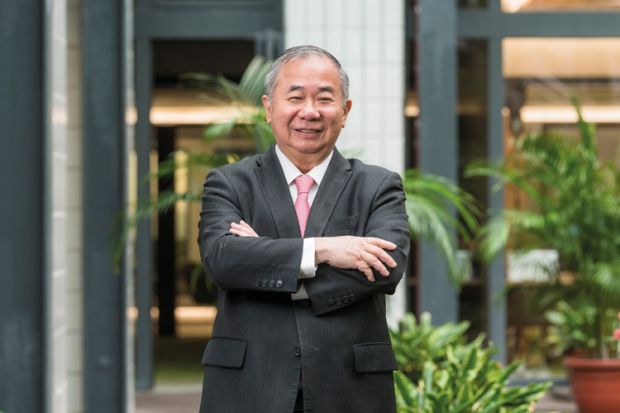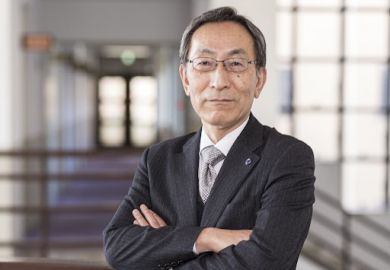Shifting in his chair, Freddy Boey smiled broadly but looked impatient to get on with business. It was just past 9am, and already the incoming head of City University of Hong Kong (CityU) was launching into the morning’s second back-to-back meeting.
“I’m a man in a hurry…I’m going to change very dramatically this whole thing here,” he said, gesturing around the cafe, located on the first floor of a faculty housing block.
Just weeks into his new role, Professor Boey has set the wheels in motion for a “sea change”, starting with the overhaul of lecture-style teaching and faculty recruitment.
The institution is due to soon unveil its new recruitment strategy targeting young academics – a contrast to the approach taken by some of the more established Hong Kong institutions, which have doubled down on hiring star talent.
“The presumption is that the past is the trajectory of the future,” Professor Boey said. “I’m not so sure.”
Instead, he wants to attract promising early career researchers, and he’s happy to spend as much money as it takes.
“My aim – and I’ll make sure all my deans understand this – is start right and you’ll end right. Once you select a person, seduce, bribe, whatever, then do everything you can to make him succeed,” he joked.
But Professor Boey was clear that selectivity is key. Unlike most universities, which hire by “blind advertising”, he is not interested in getting “what’s available”, he said.
“The guys you want are not the guys who will look for an advertisement,” he said. It’s a point he is impressing on his deans.
“Every dean I hire, I tell them I don’t care too much about how good an administrator you are. I can get a cheaper one if I want. I only want you because you can get talent.”
Professor Boey is also keen for CityU’s deans to get more involved in running the broader institution – looking beyond the performance of their individual colleges and schools.
Micromanagement, it appears, is not on the menu. “These are deans; they’re not clerks or gardeners. I expect my deans to own it.”
With this in mind, he has given his administrators free rein to hire professors at their discretion. Professor Boey calls his approach a “high-demand, high-care” philosophy. While he is willing to give his deans “as much support” as they need, he also expects outstanding performance.
If they do not deliver, he is willing to bring the axe down.
“I have to trust my deans to choose the right people. I don’t want to set up an inspection place, [but] if they’re proven not to be trusted, I need to get someone else…If you’re not up to it, if you’re only good – I’m sorry, I need better.”
Unsurprisingly perhaps, Professor Boey is not a fan of piecemeal tweaks to the teaching approach, describing them as “halfway-house solutions”.
At his previous institution, the National University of Singapore (NUS), where he was deputy president, he delivered several large-scale changes, including establishing a medical school without lecture-style teaching. Although he stopped short of saying he would eliminate lectures at CityU, it is clear that he is not afraid to shake things up.
“The people who like to hear the sound of their voice, they might regret it because they’ll probably have to spend more time teaching than talking,” he said.
In other respects, too, change is the order of the day. Although he insisted that he views CityU as being in competition with itself rather than other, higher-ranked Hong Kong institutions, Professor Boey is clearly looking to expand its reach and brand.
“Any institution that claims to be a university cannot be anything other than global,” he said. “There’s no such thing as a very reputable local university.”
Asked whether more joint degrees were in the making, Professor Boey declined to talk specifics but said a move in this direction was “almost a given”. China is an obvious area of focus, where both collaborations and students are concerned.
He believes that Hong Kong’s “so-called fixation on the mainland” – he is getting out of the habit of calling it “China” – is justified. After all, mainland students make up a quarter of CityU’s campus population, which has prompted Professor Boey to appoint a vice-president of mainland strategy and innovation.
“Non-politically speaking, Hong Kong belongs to China, so it’s not surprising that some priority is given to China,” he said.
Professor Boey likes to portray himself as an interloper, saying, “I’m just an innocent Singaporean.” The phrase, delivered with his signature cheerful tone, belies his political canniness, developed over three decades steeped in the administrative mores of Singapore – a city that, like Hong Kong, walks the geopolitical tightrope between China and the US.
But while China plays an undeniably important role in his new academic home, Professor Boey was adamant that, above all, his university must serve its local community.
“Diversity will come, but the reality is, you also need to be relevant to the society you come from.”




